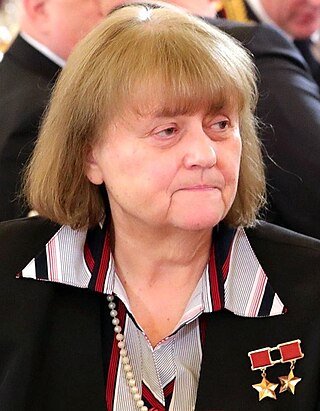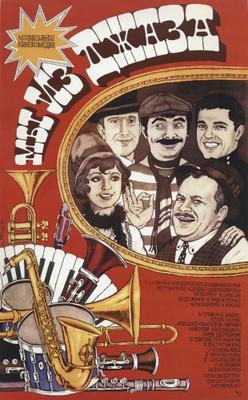
Svetlana Yevgenyevna Savitskaya is a Russian former aviator and Soviet cosmonaut who flew aboard Soyuz T-7 in 1982, becoming the second woman in space. On her 1984 Soyuz T-12 mission she became the first woman to fly to space twice, and the first woman to perform a spacewalk.

Leonid Vitalyevich Kantorovich was a Soviet mathematician and economist, known for his theory and development of techniques for the optimal allocation of resources. He is regarded as the founder of linear programming. He was the winner of the Stalin Prize in 1949 and the Nobel Memorial Prize in Economic Sciences in 1975.

Mosfilm is a film studio which is among the largest and oldest in the Russian Federation and in Europe. Founded in 1924 in the USSR as a production unit of that nation's film monopoly, its output includes most of the more widely acclaimed Soviet-era films, ranging from works by Andrei Tarkovsky and Sergei Eisenstein, to Red Westerns, to the Akira Kurosawa co-production Dersu Uzala and War and Peace.

Igor Vladimirovich Ilyinsky was a Soviet and Russian stage and film actor, director and comedian. Hero of Socialist Labour (1974) and People's Artist of the USSR (1949).

Yury Vasilyevich Yakovlev was a Soviet and Russian actor. He was awarded the honorary title of People's Artist of the USSR in 1976.

Mother is a 1926 Soviet drama film directed by Vsevolod Pudovkin. It depicts the radicalization of a mother, during the Russian Revolution of 1905, after her husband is killed and her son is imprisoned. Based on the 1906 novel The Mother by Maxim Gorky, it is the first installment in Pudovkin's "revolutionary trilogy", alongside The End of St. Petersburg (1927) and Storm Over Asia (1928).

Leonid Isaakovich Yarmolnik is a Soviet and Russian actor and film producer.

We Are from Jazz is a 1983 Soviet comedy musical film by Karen Shakhnazarov. It is also known as Jazzmen on the official Mosfilm youtube channel.
Igor Andreyevich Savchenko or Ihor Andriyovych Savchenko was a Soviet screenwriter and film director of Ukrainian origin. He has often been cited as one of the great early Soviet filmmakers, alongside Sergei Eisenstein, Vsevolod Pudovkin and Aleksandr Dovzhenko. He is also known for teaching Sergei Parajanov at the Soviet film school VGIK.

Vasili Vasilyevich Merkuryev was a Soviet and Russian stage and film actor, theater director and pedagogue. People's Artist of the USSR (1960).
His Call is a 1925 Soviet drama film directed by Yakov Protazanov. It was also released as 23 January in the Soviet Union and as Broken Chains in the United States.

Man from the Restaurant is a 1927 Soviet drama film directed by Yakov Protazanov based on the story by Ivan Shmelyov. The main role was written for Ivan Moskvin, but he was changed for Chekhov because of illness.

Miss Mend is a 1926 Soviet spy film, originally realised in three parts, directed by and starring Boris Barnet and Fyodor Otsep. It is loosely based on the books by Marietta Shaginyan. The story follows the adventures of three reporters who try to stop a biological attack on the USSR by powerful Western businessmen.

The Girl with a Hatbox or Moscow That Laughs and Weeps is a 1927 Soviet silent romantic comedy-drama film directed by Boris Barnet and starring Anna Sten, Vladimir Mikhailov and Vladimir Fogel. The picture was commissioned by the People's Commissariat (Narkomfin) to promote government bonds. It was a success with the audiences and the critics alike.

Vladimir Pavlovich Fogel was a Russian silent film actor.

Six P.M. is the 1946 American release title of the 1944 Soviet World War II film At 6 P.M. After the War (Russian: В 6 часов вечера после войны, romanized: V shest chasov vechera posle voyny, by Ivan Pyryev.
Yuri Andreyevich Zhelyabuzhsky was a Russian and Soviet cinematographer, film director, screenwriter and animator, film theorist and professor at VGIK.
Ivan Koval-Samborsky was a Ukrainian stage and film actor. After establishing himself in the Soviet film industry in the 1920s, he briefly went to work in Germany during the late 1920s before returning to Russia following the arrival of sound. In 1938 he was arrested by the Soviet authorities, leading to his most recent film, the anti-Nazi The Swamp Soldiers, having to be reshot to minimize his role. He did not appear in another film until 1957.

The Yellow Ticket or Earth in Captivity is a 1928 Soviet silent drama film directed by Fyodor Otsep and starring Anna Sten, Ivan Koval-Samborsky and Mikhail Narokov.
Peat-Bog Soldiers is a 1938 Soviet war drama film directed by Aleksandr Macheret and written by Yury Olesha.















